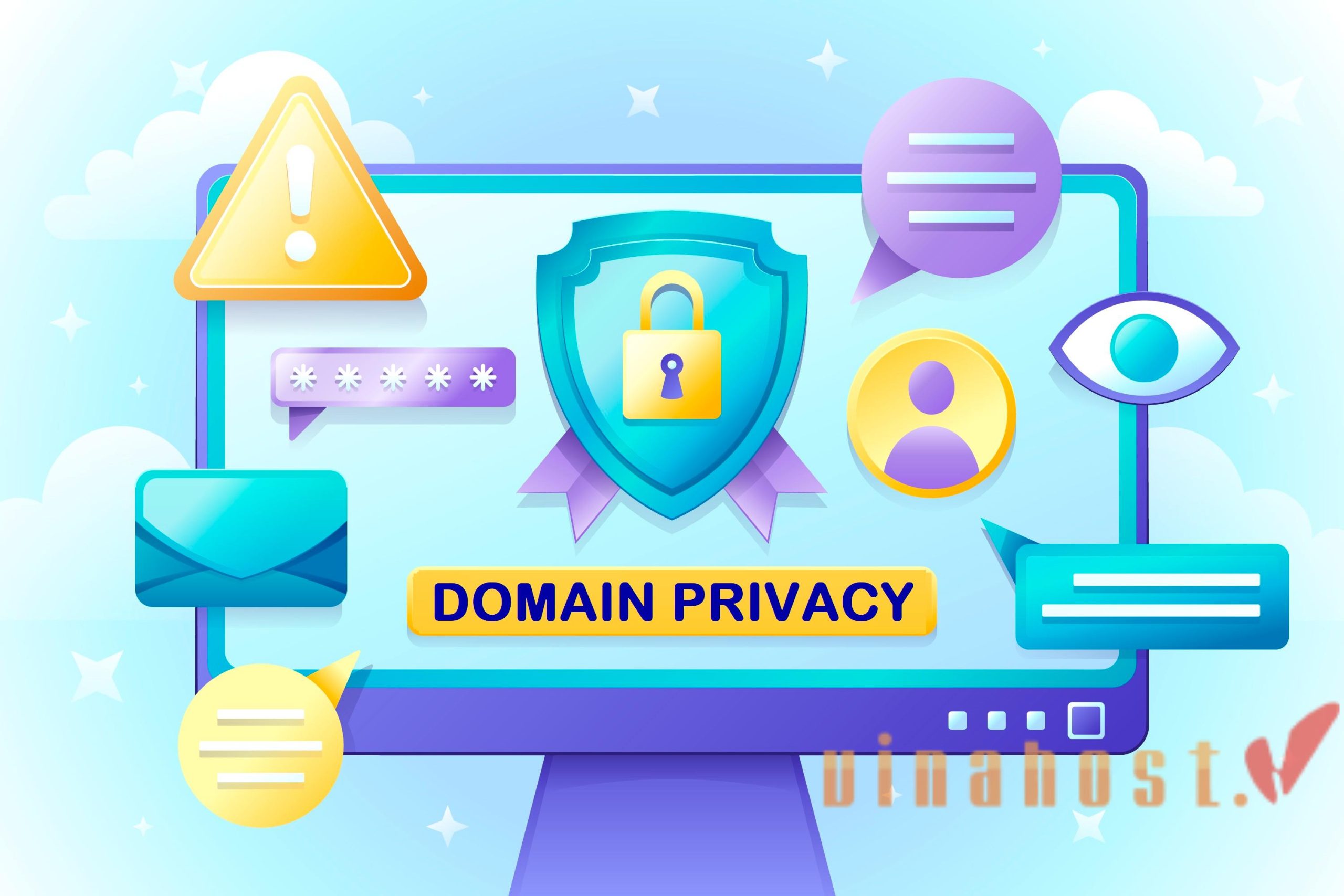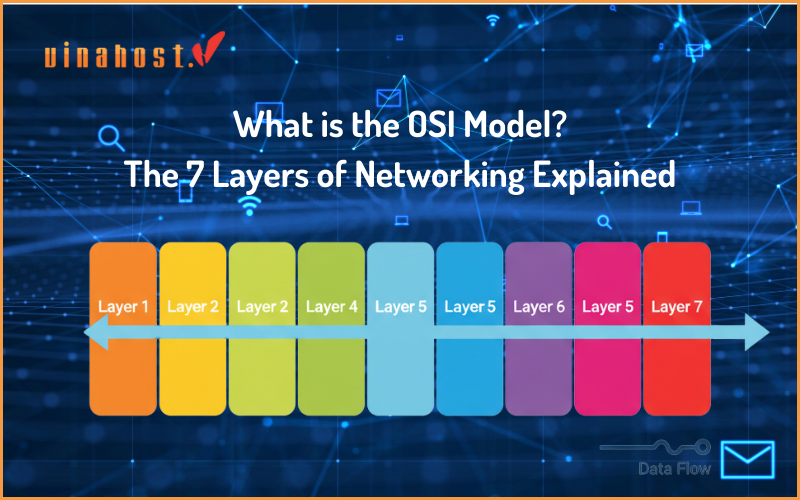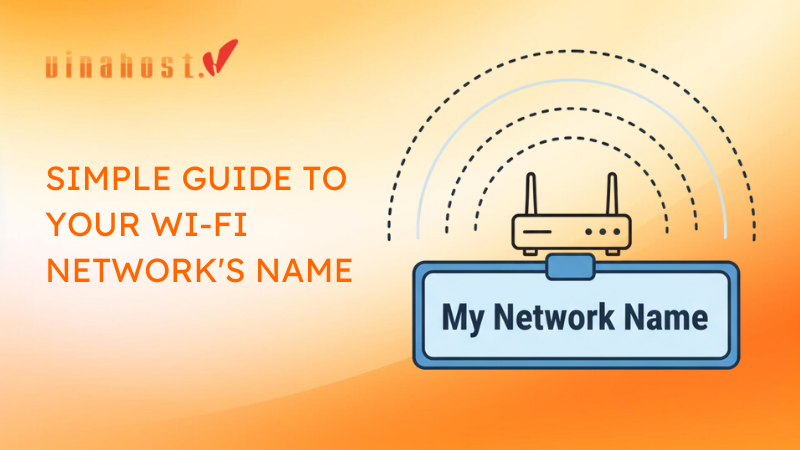What is Domain Privacy? When you register a domain name, your contact information becomes part of a publicly accessible database known as Whois. This information typically includes your name, address, phone number, and email address. While serving a legitimate purpose for domain ownership verification and communication, this public exposure can be a double-edged sword. With this article, VinaHost will help you navigate the decision of whether domain privacy is the right choice for you!
1. What is Domain Privacy?
What is domain privacy protection? Domain privacy, also known as WHOIS privacy, is a service offered by domain name registrars that protects your personal information from being publicly displayed in the WHOIS directory.
When you register a domain name, you are required to provide your contact information, such as name, address, email address, and phone number, to the registrar. This information is then stored in a publicly accessible database called the WHOIS directory. Anyone can look up this information by performing a WHOIS search on your domain name.
Domain privacy services mask your personal information in the WHOIS directory by replacing it with the contact information of a privacy service provider. This way, your personal information is not visible to the public.
What is full domain privacy & protection? It’s the service that provides a more holistic approach to securing your domain name registration and ensuring a safer and more secure online presence.
2. How Does Domain Privacy Work?

Domain privacy works by replacing your personal contact information with the details of a privacy service in the Whois database, thereby protecting your identity and personal details from being publicly accessible. This service typically includes email and sometimes mail forwarding to ensure you still receive important communications.
Without domain privacy:
When you register a domain name, your personal contact details are put into a public database called Whois. Anyone can look up your domain and see your contact details.
This typically includes:
- Your name
- Your address
- Your phone number
- Your email address
With domain privacy:
Instead of showing your details, the domain registrar’s privacy service shows their own contact details in the Whois database.
Substitution of details: The privacy service provided by your domain registrar replaces your personal contact information with its own generic contact details in the Whois database. For example:
- Registrant Name: Whois Privacy Service
- Registrant Organization: Domain Privacy Service
- Registrant Street: Proxy Address
- Registrant City: Privacy City
- Registrant State/Province: Privacy State
- Registrant Postal Code: 12345
- Registrant Country: Privacy Country
- Registrant Phone: +1.234567890
- Registrant Email: proxyemail@privacyservice.com
Forwarding service: The privacy service typically sets up a forwarding system for communications. For example:
- Email forwarding: Emails sent to the proxy email address listed in the Whois record are forwarded to your actual email address.
- Mail forwarding: Physical mail sent to the proxy address can be forwarded to your real address, though this is less common and may incur additional costs.
- Phone calls: In some cases, the proxy phone number listed might forward calls to your real phone number, or provide a voicemail system that forwards messages.
By the end of this part, you can answer the question “what is domain privacy and do i need it”, right?
Also read: What is Whois? | Everything You Need To Know Whois
3. Why Does My Domain Information Need Protection?

4. The Advantages of Domain Privacy
Domain privacy provides a valuable security and privacy solution for individuals and businesses alike:
Protect your personal information:
- Domain privacy services mask your personal details (name, address, email, phone number) in the Whois database, replacing them with the contact details of the privacy service provider.
- By keeping your personal information confidential, domain privacy protects you from potential exposure to the public, ensuring that your sensitive information isn’t easily accessible to anyone who performs a Whois lookup.
Prevent unsolicited marketing outreach:
- With your phone number and address hidden, marketers have a harder time reaching you for unsolicited calls and mail.
- Marketers and sales entities often scrape Whois databases for contact information. Domain privacy prevents your details from being collected and used for marketing purposes.
Compliance with Privacy Regulations:
- Domain privacy helps you comply with data protection regulations such as the General Data Protection Regulation (GDPR) in the European Union, which mandates the protection of personal data.
Minimize spam:
- By substituting your real email address with a proxy email address provided by the privacy service, you significantly reduce the amount of spam you receive. The proxy address forwards legitimate emails to you while filtering out spam.
- This layer of protection ensures that only genuine communications reach you, keeping your inbox cleaner and more secure.
Greater control over your personal information:
- With domain privacy, you decide who gets to see your real contact information. This gives you more control over your data and how it’s shared.
- Limiting access to your personal details helps protect you from social engineering attacks, identity theft, and other security threats. By controlling the flow of information, you can better manage your online security.
Simplified contact management:
- Domain privacy services typically provide a single point of contact (the privacy service provider) for all inquiries, which can simplify the management of communications related to your domain.
Also read: The Value of Domain Names: Choosing the Right Domain for Your Website
5. The Downsides of Domain Privacy

Additional cost: Domain privacy is typically offered as an add-on service by domain registrars, which means you’ll need to pay an additional fee on top of your domain registration cost. While the fee is usually nominal, it can add up if you manage multiple domains.
Complexity in communication:
- Since the privacy service acts as an intermediary, there might be a delay in receiving messages forwarded from the privacy service to your real email address. This can complicate and slow down communication.
- Some emails or messages might get lost or filtered out as spam during the forwarding process, leading to missed important communications.
Legal and compliance issues:
- In the case of legal disputes, court orders, or law enforcement requests, the privacy service may be required to disclose your personal information. This can negate the privacy benefits you initially sought.
- Certain jurisdictions and top-level domains (TLDs) do not support domain privacy services due to local regulations or policies, limiting your ability to use these services for some domains.
Perception and trust issues:
- Some customers, partners, or stakeholders might view the use of domain privacy as a lack of transparency, potentially reducing trust, especially for businesses and professional services.
- For businesses, having masked contact information can sometimes appear less credible or professional, leading to skepticism from potential clients or customers.
Service dependency:
- When you use a domain privacy service, you become reliant on your domain registrar to manage and protect your information properly. Any changes in their policies, service quality, or security practices can impact your privacy.
- If the privacy service experiences technical issues or disruptions, your contact information might temporarily become exposed or communication might be interrupted.
Domain ownership verification:
- If you need to prove ownership of the domain (for example, in a dispute or when selling the domain), the use of privacy services can complicate the verification process. You may need to go through additional steps to prove that you are the actual owner.
Also read: What is Transfer Domain? & How to Transfer a Domain?
6. Do You Need Domain Privacy?
Deciding whether you need domain privacy depends on your priorities regarding privacy, security, and transparency. Domain privacy protects your personal information by replacing it with the registrar’s contact details in the public Whois database, thereby reducing spam, unsolicited contact, and the risk of identity theft. It’s particularly beneficial if you value anonymity and wish to safeguard against online harassment or fraud.
However, it comes with additional costs and may complicate communication or domain ownership verification. If your business relies on transparency and customer trust, you might opt against it. Ultimately, if you prioritize protecting your personal information and minimizing unwanted contacts, domain privacy is a valuable investment.
7. The Future of Domain Privacy

Domain registrars will likely play a crucial role in the future of domain privacy. They might offer more sophisticated privacy protection features and ensure compliance with evolving regulations.
As privacy becomes a growing priority for individuals and businesses alike, domain privacy services will likely become more sophisticated and integral to domain registration processes.
These are the trend that may affect future of Domain Privacy:
- Increased demand for privacy: With growing awareness of online privacy issues and stricter data protection regulations like GDPR, the demand for domain privacy is likely to continue rising. People will value control over their personal information more and more.
- Technological advancements: New technologies like blockchain or decentralized domain name systems (DNS) could emerge, offering alternative ways to register domains without relying on publicly accessible WHOIS directories. This could significantly enhance domain privacy.
- Legal developments: Regulatory bodies might introduce stricter rules regarding WHOIS data access and privacy protections. This could lead to a more standardized approach to domain privacy across different regions.
- Balance between privacy and security: Finding a balance between user privacy and the need for law enforcement and rights holders to access information for legitimate purposes will be a constant challenge. Initiatives like redacting certain data fields or tiered access systems might be explored.
- Domain privacy as standard: In an ideal scenario, domain privacy could become the default setting for domain registrations, with users opting out if they choose to make their information public. This would significantly enhance online privacy for the majority of users.
- Transparency for businesses: Finding ways for businesses to maintain transparency while using domain privacy, perhaps through separate publicly available contact information, will be an ongoing discussion.
- Global consistency: Achieving a consistent approach to domain privacy across different countries will be a complex task, but international collaboration might be crucial for a more secure and private online environment.
Also read: What is VN domain? | Overview of domain names .VN
8. FAQs
8.1. Is domain privacy free?

8.2. Can I activate domain privacy after registering my domain?
Yes, you can typically activate domain privacy after registering your domain. Most domain registrars offer domain privacy as an optional service that you can add at any time, even after the initial registration process. You can usually enable domain privacy through your registrar’s control panel or by contacting their customer support.
Once activated, the registrar will replace your personal contact information in the Whois database with their own proxy information, enhancing the privacy and security of your domain.
To get domain privacy, you can follow these steps:
- Choose a domain registrar: Select a domain registrar that offers domain privacy services. Most reputable registrars provide this option.
- Register your domain: Purchase the domain name you want through the registrar’s website. During the registration process, you’ll typically have the option to add domain privacy to your order.
- Select domain privacy: When prompted, choose to add domain privacy to your domain registration. This may be presented as an additional service or an opt-in checkbox during the checkout process.
- Complete the purchase: Follow the prompts to complete your domain registration, including payment for any associated fees for domain privacy.
- Activate domain privacy: After completing your purchase, the registrar will activate domain privacy for your domain. Your personal contact information will be replaced with proxy details in the public Whois database.
Also Read: What is .ai.vn domain? | Overview of domain names .ai.vn
8.3. Does Domain Privacy Affect SEO?

You’ve known what is domain name privacy, but does domain privacy affect SEO?
In the past, there might have been some speculation that domain privacy could negatively impact SEO according to Google and current best practices. However, this is no longer a concern. Search engine guidelines have evolved, and WHOIS information is not considered a relevant ranking signal.
Here’s why:
- Search engines can dee through it: Google, the dominant search engine, is also a domain registrar. They have the ability to see past the masking used by domain privacy services and access the real owner information.
- Not a ranking factor: Search engine algorithms like Google’s don’t consider WHOIS information as a ranking factor. They focus on the content and quality of your website, not the privacy settings of your domain registration.
- Focus on content and user experience: For SEO success, it’s more important to concentrate on creating high-quality, relevant content and providing a good user experience on your website. These are the factors that search engines prioritize when ranking websites.
Search engines like Google primarily focus on factors such as content relevance, quality, and user experience when determining search result rankings. However, there are some indirect ways in which domain privacy might impact SEO:
- Competitor insights: Domain privacy can make it more challenging for competitors to gather information about your website, such as ownership details or historical data, potentially impacting competitive analysis strategies.
- User trust: Domain privacy can enhance user trust by protecting your personal information from being publicly accessible. Visitors may feel more confident interacting with a website that respects their privacy.
- Perceived legitimacy: Some users may view websites with privacy protection as more legitimate and trustworthy, positively impacting factors like bounce rates and time on site, which can indirectly influence SEO.
- Relationship building: Some individuals and organizations may be more reluctant to establish relationships, partnerships, or backlinks with websites that have domain privacy, as they prefer transparency and direct communication.
- Outreach and collaboration: Without easily accessible contact information, outreach efforts for collaborations, guest posts, or other SEO-related activities may be hindered.
- Reduced spam: Domain privacy helps prevent spam emails and unwanted contact, which can indirectly improve user experience and reduce distractions that could affect engagement metrics.
- Security measures: Websites with domain privacy may be seen as taking proactive steps to protect user data, potentially leading to better overall security perceptions.
Also Read: What is domain .com.vn? | Overview of domain names .com.vn
9. Conclusion
In conclusion, domain privacy protection serves as a crucial safeguard for website owners, offering an array of benefits that extend beyond mere anonymity. By concealing personal information from the publicly accessible WHOIS database, domain privacy shields registrants from a multitude of potential threats, including identity theft, spam, and harassment. This protective measure is particularly valuable in an age where cybercrime is rampant and personal data is a coveted asset for malicious actors.
As cyber threats become more sophisticated, the adoption of domain privacy measures will likely become an increasingly common practice among conscientious website owners. Through this exploration of what is domain privacy, we hope to equip you with the necessary knowledge for managing your domain.
Find out more articles at our Blog and don’t hesitate to contact us for support:
- Email: support@vinahost.vn
- Hotline: 1900 6046
- Livechat: https://livechat.vinahost.vn/chat.php
>>> Read more:
What is ICANN? | Why Does ICANN Matter | How It Works
What is .net.vn domain? | Overview of domain names .net.vn
What is .ac.vn domain? | Overview of domain names .ac.vn
What is .int.vn domain? | Overview of domain names .int.vn


 Tiếng Việt
Tiếng Việt English
English 简体中文
简体中文






























































































